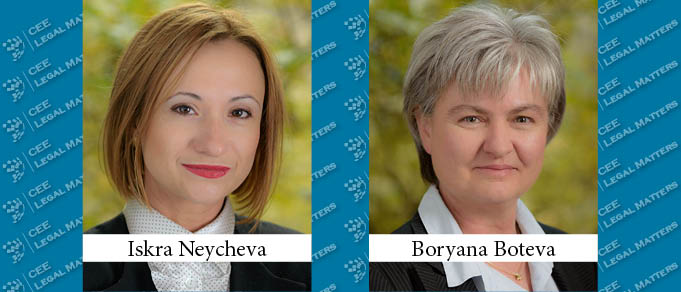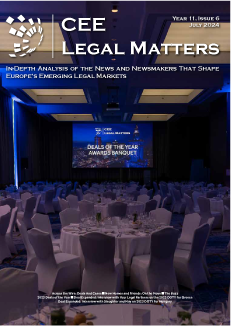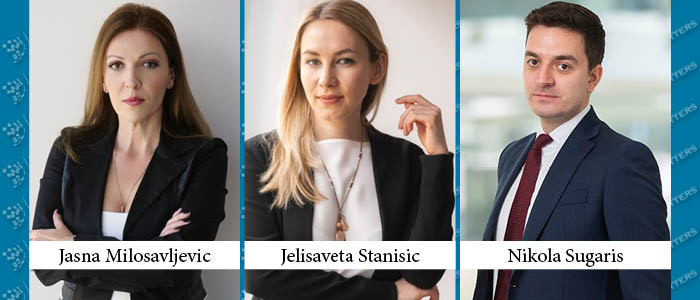On July 28, 2020, CEE Legal Matters reported that Bulgaria’s Sabev & Partners law firm, working alongside DLA Piper, had advised the Government of Bulgaria on the tender procedure for the 35-year concession agreement for the Sofia Airport in Bulgaria, which was ultimately awarded to SOF Connect Consortium, led by Meridiam and including Munich Airport and Strabag, on its successful bid. We spoke to Sabev & Partners Iskra Neycheva and Boryana Boteva about the firm’s work on the project.
CEELM: First, congratulations on the impressive project!
Boryana: Thank you! It was really challenging and exciting for us to work on such an important project. In fact, this is the most significant project in Bulgaria in recent years in the air transport infrastructure industry, as Sofia Airport is the largest airport for public use in the country. Moreover, this is the first project for a concession with cross-border interest under Bulgaria’s new Concessions Act (which came into force on January 2nd, 2018, transposing Directive 2014/23/EU on the award of concession contracts). It is a mixed concession – including both construction and operations – and it was awarded via an open tender procedure – which is the most transparent type of procedure, although very difficult to prepare and administer. The result justified all the efforts – there were five excellent offers submitted by highly experienced and reputable investors!
CEELM: Who was on the Sabev & Partners team?
Boryana: I led our firm’s team, and I was directly involved in all phases of the project and all tasks performed by the team. My colleague Iskra Neycheva carried out the review of the relevant legal framework and participated in the initial discussions on the structure of the transaction, the tender documents, and the draft concession agreement. Two other partners of the law firm were also involved with different roles: Nevena Stoeva actively participated in the legal due diligence, while Managing Partner George Sabev acted mostly as liaison with the interested governmental bodies.
CEELM: What were the terms of the winning bid? What is the agreement, going forward?
Boryana: In terms of specific undertakings, the following can be outlined: the concession period is thirty-five years, with an option to be extended for up to one third of the initial period; there is an upfront concession fee of BGN 550 million (about EUR 281 million) and annual concession fees (the higher of EUR 24.5 million and 32% of the aggregate concession revenues per year); there is an investment program of EUR 608 million to be implemented by the concessionaire throughout the concession period, which includes building a new terminal – Terminal 3 – by the end of the tenth concession year. More importantly, it is expected – and we believe – that the signing of this concession agreement sets the start of a promising long-term public-private partnership, which will not only be beneficial for the parties to the agreement, but will also contribute to the development of Bulgaria’s economy.
CEELM: Can you tell us how and why the project was initiated? Why a new concession was necessary for the airport?
Iskra: Actually, this is the first concession award procedure for Sofia Airport that reached a successful end. Over the past few years, there were a lot of discussions regarding the most appropriate way of acting – including possible privatization (quickly rejected as an option), a simple service concession (covering only the operation of the airport), or keeping the status as it is, with the airport continuing to be managed and operated by a state-owned company. There were also a couple of attempts to initiate concession procedures, which failed. In any case, it was obvious that the airport needed fresh funds and premium quality management to stay competitive and develop further – and the previous example of Bulgaria’s sea-side airports in Varna and Burgas showed that this can be best achieved through a public-private partnership.
CEELM: How exactly did Sabev & Partners get involved in this matter?
Boryana: The main consultant engaged by the Bulgarian Government through the Ministry of Transport, Information Technology and Communications – the concession grantor – was the International Finance Corporation, which then engaged Sabev & Partners as local legal consultants. And, with the support of the European Bank for Reconstruction and Development, DLA Piper was engaged as international legal consultant.
CEELM: What work did Sabev & Partners do on the project, exactly?
Iskra: We did a lot, actually. The main tasks we performed included overviewing and analyzing the relevant legal framework, providing legal due diligence of Sofia Airport (focussing primarily on real estate, contractual and employment matters), advising and assisting in the development of the transaction structure, reviewing drafts of the tender documents (including instructions to bidders and a draft of the concession agreement) to ensure compliance with Bulgarian law, providing advice during intensive Q&A sessions, assisting during the launch and carrying-out of the concession procedure, providing post-award assistance, including consulting on specific issues during the appeal proceedings, and, following the confirmation of the award by the court, providing assistance with the commercial close of the transaction (i.e., the signing of the concession agreement).
CEELM: What was the relationship between your firm and DLA Piper like on this matter?
Boryana: Formally, the two firms had separate independent engagements. However, the nature of the work required that we coordinate closely – as the aim was to set up the procedural rules and compile the tender documents in a way that not only ensures compliance with Bulgarian legislation but also with best international practices for such projects. It was even more important that the concession agreement be structured and drafted as closely as possible to a model that is well-known and acceptable to international investors and financial institutions. To achieve this, the two firms worked together on a daily basis – in particular during the extremely busy Q&A sessions (there were more than 3,000 Q&As processed in two languages!). We are really happy to say that the two teams managed to establish effective collaboration, based on a high level of partner involvement, personal dedication, and friendly atmosphere! In addition, although we already have more than 20 years of legal experience, we gained valuable experience from our joint work with Jasna Zwitter-Tehovnik from DLA Piper Vienna and Francesco Ferrari from DLA Piper Milan.
CEELM: Did the COVID-19 crisis impact the process in any way?
Iskra: The concession award decision was announced in July 2019. Then a review process followed, based on appeals filed by all other bidders. The award decision was finally confirmed by the Supreme Administrative Court of Bulgaria on June 5th, 2020 and the concession agreement was signed on July 22. Unfortunately, the outbreak of the COVID-19 crisis happened in the period immediately before the finalization of the procedure and the signing of the concession agreement. Although the crisis seriously affected the air transport industry, the winning bidder did not step back, and it signed the agreement – a difficult and courageous decision, for which it should be congratulated. Moreover, in view of the type of the award procedure, there was no possibility to negotiate any amendments to the agreement before its signing! However, it has to be noted that there is a transition period of up to 12 months following the signing, during which a lot of conditions precedent are to be fulfilled to complete the financial close of the transaction and the concession commencement date to occur. We do hope that the parties will manage to find solutions to deal with any COVID-19 related issues, and that they are able to successfully complete this phase of the transaction as well.
CEELM: Is Sabev & Partners involved in any way in the ongoing transition period?
Iskra: Our involvement in the matter is 100% concluded at this point.
CEELM: Going forward, what is this concession agreement expected to do for the airport, and for the country?
Iskra: It is expected that the concession will contribute to the more efficient and effective management of the airport based on the concessionaire’s experience and know-how. The concessionaire is required to make significant investments in the development and modernization of the airport infrastructure and to improve the organization and quality of the airport services. The commercial activities of the airport should be expanded and developed further, including by opening new shops, restaurants, and cafeterias. The safety and security of the airport and the flights should be improved through the use of new technologies and the transfer of knowledge and experience. The concessionaire is expected to develop new flight routes from and to Sofia, both for passenger and cargo traffic and enhance the airport’s position as a regional hub for flights within the Middle East, Transcaucasia, and Central Europe. The desired result is to promote the airport’s status as a world-class airport, increase its competitiveness, and attract more traffic. The achievement of these goals should lead to growth of tourism and auxiliary services, foreign investment, and budget revenues.
This Article was originally published in Issue 7.8 of the CEE Legal Matters Magazine. If you would like to receive a hard copy of the magazine, you can subscribe here.




















